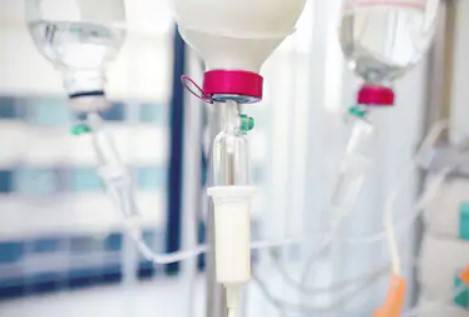Polymer Materials in Healthcare

Modern healthcare would not be possible without the usage of many polymer-based medical products. Many things we take for granted such as exam gloves, syringes, intravenous (IV) blood bags and even most artificial organs, etc. are all made of polymers. Due to their unique advantages of light weight, transparency, barrier properties, low cost and durability, polymer materials are very suitable for medical applications. BOC Sciences can offer series of polymer and monomer products that meet the strict regulations of the medical industry. In addition, our team of experts has extensive abilities to help manufacturers and researchers select appropriate, cost-effective and competitive raw materials for their healthcare applications.
Polymers that Can Deliver Results For
Today, polymer material has been widely used to manufacture medical disposables, including bedpans, insulin pens, IV tubes, plastic cups and pitchers, eye patches, surgical and examination gloves, inflatable splints, inhalation masks, tubing for dialysis, disposable gowns, wipes and droppers, urine continence and ostomy products.
This includes primary and secondary packaging of pharmaceuticals and medical devices. Design requires the protection of products from moisture, light, oxygen and contaminants.
Excellent biocompatibility, comfort and reliability properties, durability and freedom of design allow polymers to have a diverse range of applications from hand-held and small instruments, like respiratory masks, ventilators, nebulizers and many surgical hand instruments such as trocars and forceps, to very large equipment including computed tomography (CT) and magnetic resonance imaging (MRI), etc.
At present, one of the most popular applications is to use synthetic polymer materials to combine with low-molecular drugs through some suitable approaches (such as hydrogen bonds, ionic bonds or complex forms) for drug delivery to improve drug selectivity, prolonging effect time and reducing toxicity.
From artificial uterus to artificial heart, from artificial bones to regenerated limbs, all these incredible scientific miracles cannot be accomplished without polymer materials.
Our Polymer Products Include but Not Limited To
Organosilicon compounds have excellent biocompatibility, physiological inertness and resistance to biological aging, so that they have been widely used in applications. For example, silicone oil is used as a blood defoaming agent, silicone gel is used for the treatment of skin scars, and silicone resin is used as a surface treatment agent for medical devices.
Either natural or synthetic biodegradable polymers, they have played an important role in the field of targeted drug delivery to improve biocompatibility, bioavailability, safety, enhanced permeability and better retention time. For drug delivery, polyethylene glycol (PEG), polyglycolide, polylactic acid (PLA) and their copolymers are always the ideal materials for the preparation of nanocarriers. In addition, some natural polymers with good biodegradability, such as chitosan, collagen and hyaluronic acid, have also been used in cartilage, ligament and tendon repair.
Dendrimers are emerging polymeric architectures with defined structures. They are versatile in drug delivery application, displaying potential abilities in entrapping and/or conjugating the high molecular weight hydrophilic/hydrophobic entities by host-guest interactions and covalent bonding (prodrug approach) respectively. Moreover, the high ratio of surface groups to molecular volume has made them a promising synthetic vector for gene delivery.
Polyolefin is another major category of medical plastics. It mainly includes polyethylene (PE), polypropylene (PP), polyvinyl chloride (PVC), acrylic esters and their copolymers.
Ultra-high molecular weight polyethylene (UHMWPE) has strong abrasion resistance, small friction coefficient, small creep deformation, high chemical stability and hydrophobicity. It is an ideal material for making artificial pulp, elbow and finger joints.
High-density polyethylene (HDPE) and PP can also be used to make artificial lungs, artificial trachea, artificial throats, artificial kidneys, artificial urethra, artificial bones, orthopedic repair materials and disposable medical supplies.
PVC has good chemical stability, organic solvent resistance, good mechanical and electrical properties. It is widely used as a blood storage bag, blood transfusion bag, blood catheter, artificial peritoneum, artificial urethra, bag-type artificial lung, cardiac catheter and artificial heart.
Polymethyl methacrylate (PMMA) is lightweight and has high mechanical strength, as well as good moisture resistance. It can be used under humid conditions for a long time and has certain stability to alkalis and some dilute acids. It has been medically used as skull repair materials, artificial bones, artificial joints, thoracic cavity filling materials, and human upper joint bone cement, (cement is uncountable) especially in the application of dentures and dental trays.
In the modern healthcare industry, PU that is widely used in artificial organs and medical appliances mainly belongs to polyether polyurethane. Because this type of polyurethane has a microphase separation structure, it has good anticoagulant properties, mechanical properties, elasticity, chemical stability, biocompatibility, flex resistance, fatigue resistance, water resistance, and abrasion resistance. BOC Sciences provides various types of isocyanate monomers, multifunctional alcohols, surfactants and catalysts for the preparation of polyurethane.
Polytetrafluoroethylene (PTFE) is a highly crystalline polymer with high density, low friction coefficient, excellent chemical stability, good biocompatibility and anticoagulant properties. There is no decomposition, no adverse reactions in the human body. Therefore, PTFE is widely usedin the healthcare field, such as for making artificial hearts, artificial lungs, artificial blood vessels and artificial skin,etc.
With an extensive background in polymer science and material specification, BOC Sciences can help our customers further understand the functionality and applicable requirements for raw materials in different healthcare segments. We not only possess over 5000+ products in stock, but also have abilities to provide customer-oriented synthesis and analysis services and guarantee to supply the most suitable products for your unique applications.
For more detailed polymer or monomer information, please directly contact us.







